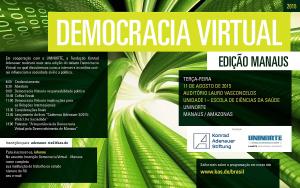Event Reports
The seminar revolved entirely around the notion of international exchanges. In two panels, the social networks like Facebook, Twitter, and Instagram as well as other social media platforms were debated as regards their effects on the behaviour of decision-makers in the international arena. More than 110 students participated in this year’s third edition of the event.
In this context, Ricardo Kadouaki, longtime employee of the Institute for Technology & Society (ITS) in Rio de Janeiro, presented the Plataforma Brasil, a qualitative discussion platform held in Portuguese. While privately owned social networks ultimately aim to achieve profit maximization, qualitative discussion platforms which aim to stimulate debates can serve as the basis for new ways of thinking and patterns of argumentation, but these often lack reach. Initially, Facebook did not aim at cultivating an internet discussion culture, but special algorithms allow the targeted placement of adverts or messages to the user. Meanwhile, platforms aiming at peer communication are not interested in Virtual Democracy.
Helso do Carmo Ribeiro Filho, Professor of International Relations at the UNINORTE University in Manaus, elaborated on the evolution of the Internet since its inception and sketched a brief history of the origins of the "digital revolution". He drew a comparison with the "Industrial Revolution" of the 19th century, and criticised the increase in inequality within the society of the Amazon, which he considered could be increased through access to the digital world in view of the gap between internet users and people deprived of technology. To give an idea of size: the Amazon State, were it a sovereign nation, would be the eighteenth-largest country in the world. Two out of three residents in Manaus have access to digital technology. Every third resident, however, lives in partly inaccessible areas of the state, where there is little public infrastructure, including digital infrastructure. As a result, a great many citizens do not have access to information leaving them less able to – participate politically.
This talk was followed by a discussion moderated by Christian Matthäus. Professor Erivaldo Cavalcanti e Silva Filho from the UNINORTE opened up the second round of lectures. His remarks referred to the difference between the public and the private sphere, noting that these are often inseparable in politics. Equally, the international division of labour tremendously changed the way these spheres are lived: constant availability even after work firmly underpinned the steady mixing between private and professional life. Although economic output could be increased, traditions and values would be subject to change, especially in the Amazon region.
As Chairman of the Association of Brazilian Students in International Relations (FENERI), Pedro Rafael Pérez de Azevedo is well-versed with Brazil's national policies and the values and norms of the international system. In this regard, his presentation contributed to a better understanding of the implementation of national policies for Internet regulation in the areas of security, espionage and data protection.
Reinaldo Themoteo, editor at KAS Brazil, moderated the discussion after the second panel and solemnly presented – together with Christian Matthäus – the Adenauer-Booklet 03/2015: Internet and Society . KAS Brazil quarterly publishes the "Cadernos Adenauer" (Adenauer-Booklets). Each edition prioritises a different theme. To this end, KAS invites experts to outline the latest scientific findings about socially relevant issues in Brazil in the areas of national and international politics, trade and economy, society and religion. Themoteo presented the individual chapters, dealing with Internet security, Internet activism, the use of the Internet by Brazilian political parties, and Virtual Democracy among other things. Matthäus underlined the topic’s outreach up to the highest political ranks and committed to the thematic priorities of virtual democracy for KAS, which strengthens Brazilian democracy. Each participant received a hot-off-the presses copy of the third edition of the Adenauer-Booklets.
Farid Mendonça Junior, Deputy Minister of International Relations of the Amazon state rounded off the event in his keynote speech "Amazon State and its international relations in the era of the Internet". The Minister underlined the connections of the state, bordering Venezuela, Colombia, Peru and Bolivia and sketched everyday situations in the border regions. It was noted that the role of the Internet and the digital world in the large and small cross-border traffic, the fight against cross-border drug routes, and the preservation of natural habitats in the Amazon rainforest ought not to be underestimated. Manaus as a regional hub is a networked international city due to its free-trade area, which focusses on the production of digital devices and so economically benefits from the advances in the digital age.
After the following question and answer session, Christian Matthäus thanked all students and panellists for their participation and invited to the official launch of the Adenauer-Booklets and a cocktail reception, where the dialogue between speakers and students continued.
















